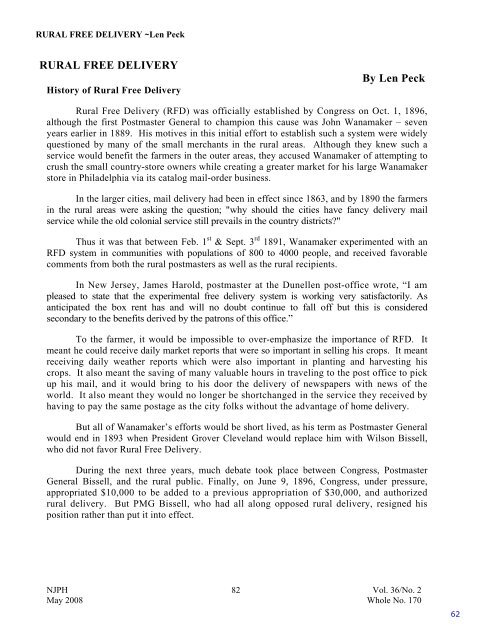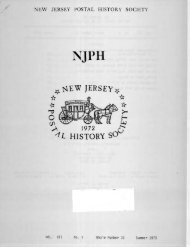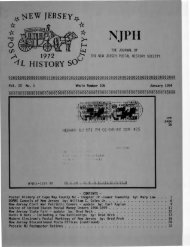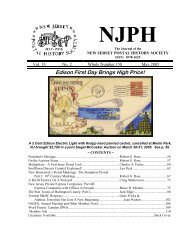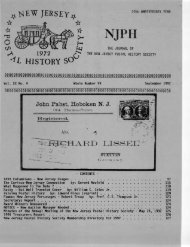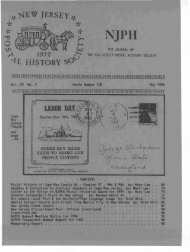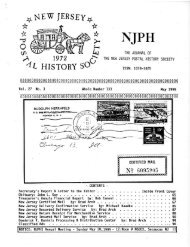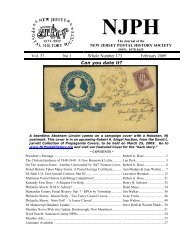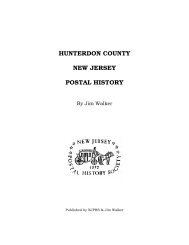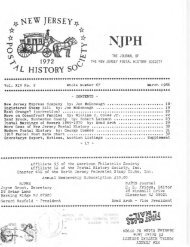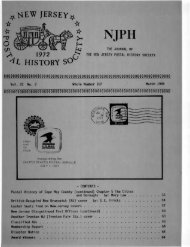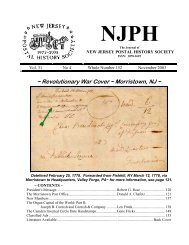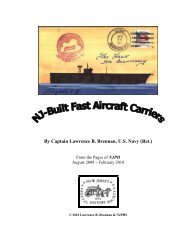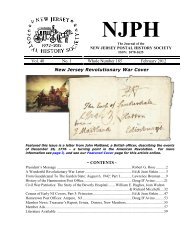Essays on Sussex County and New Jersey Postal History
Essays on Sussex County and New Jersey Postal History
Essays on Sussex County and New Jersey Postal History
Create successful ePaper yourself
Turn your PDF publications into a flip-book with our unique Google optimized e-Paper software.
RURAL FREE DELIVERY ~Len PeckRURAL FREE DELIVERY<strong>History</strong> of Rural Free DeliveryBy Len PeckRural Free Delivery (RFD) was officially established by C<strong>on</strong>gress <strong>on</strong> Oct. 1, 1896,although the first Postmaster General to champi<strong>on</strong> this cause was John Wanamaker – sevenyears earlier in 1889. His motives in this initial effort to establish such a system were widelyquesti<strong>on</strong>ed by many of the small merchants in the rural areas. Although they knew such aservice would benefit the farmers in the outer areas, they accused Wanamaker of attempting tocrush the small country-store owners while creating a greater market for his large Wanamakerstore in Philadelphia via its catalog mail-order business.In the larger cities, mail delivery had been in effect since 1863, <strong>and</strong> by 1890 the farmersin the rural areas were asking the questi<strong>on</strong>; "why should the cities have fancy delivery mailservice while the old col<strong>on</strong>ial service still prevails in the country districts?"Thus it was that between Feb. 1 st & Sept. 3 rd 1891, Wanamaker experimented with anRFD system in communities with populati<strong>on</strong>s of 800 to 4000 people, <strong>and</strong> received favorablecomments from both the rural postmasters as well as the rural recipients.In <strong>New</strong> <strong>Jersey</strong>, James Harold, postmaster at the Dunellen post-office wrote, “I ampleased to state that the experimental free delivery system is working very satisfactorily. Asanticipated the box rent has <strong>and</strong> will no doubt c<strong>on</strong>tinue to fall off but this is c<strong>on</strong>sideredsec<strong>on</strong>dary to the benefits derived by the patr<strong>on</strong>s of this office.”To the farmer, it would be impossible to over-emphasize the importance of RFD. Itmeant he could receive daily market reports that were so important in selling his crops. It meantreceiving daily weather reports which were also important in planting <strong>and</strong> harvesting hiscrops. It also meant the saving of many valuable hours in traveling to the post office to pickup his mail, <strong>and</strong> it would bring to his door the delivery of newspapers with news of theworld. It also meant they would no l<strong>on</strong>ger be shortchanged in the service they received byhaving to pay the same postage as the city folks without the advantage of home delivery.But all of Wanamaker’s efforts would be short lived, as his term as Postmaster Generalwould end in 1893 when President Grover Clevel<strong>and</strong> would replace him with Wils<strong>on</strong> Bissell,who did not favor Rural Free Delivery.During the next three years, much debate took place between C<strong>on</strong>gress, PostmasterGeneral Bissell, <strong>and</strong> the rural public. Finally, <strong>on</strong> June 9, 1896, C<strong>on</strong>gress, under pressure,appropriated $10,000 to be added to a previous appropriati<strong>on</strong> of $30,000, <strong>and</strong> authorizedrural delivery. But PMG Bissell, who had all al<strong>on</strong>g opposed rural delivery, resigned hispositi<strong>on</strong> rather than put it into effect.NJPH 82Vol. 36/No. 2May 2008 Whole No. 17062


